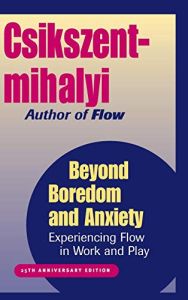Join getAbstract to access the summary!

Join getAbstract to access the summary!
Mihaly Csikszentmihalyi
Beyond Boredom and Anxiety
Experiencing Flow in Work and Play
Jossey-Bass, 2000
What's inside?
If you offer money and status, your employees will work for you. But if you offer skills, thrills and “flow,” they will work for themselves. Or so says this 25-year-old classic.
Recommendation
Mihaly Csikszentmihaly presents a detailed examination of motivation based on a study of a half-dozen groups of people involved in recreational pursuits: rock climbers, composers, dancers, chess players and basketball players. He chose these groups in an effort to understand more fully what motivates people to engage in activities that are extremely challenging or offer few external rewards. Although some of his conclusions may be of interest to executives and managers seeking ways to motivate employees, most readers will find this academic study too detailed. Some of the interview comments are interesting, but much of the book describes survey results, a discussion that non-statisticians may be hard put to follow. Because of this complexity and because of the book's somewhat dense prose, getAbstract recommends this 25-year-old reissued classic primarily to scholars or to those who are intensely curious about the nuts-and-bolts of motivation. But any human resources professional or leadership specialist should have at least a passing familiarity with its concepts and contents.
Summary
About the Author
Mihaly Csikszentmihalyi , Ph.D., is a professor and former chair of the department of psychology at the University of Chicago. He is currently the Davidson Professor of Management and the director of the Quality of Life Research Center at Claremont Graduate University. He is the author of several books dealing with flow and intrinsic motivation including Flow: The Psychology of Optimal Experience ; Creativity: Flow and the Psychology of Discovery and Invention , and Finding Flow: The Psychology of Engagement with Everything in Life .





















Comment on this summary